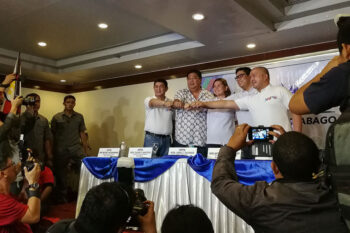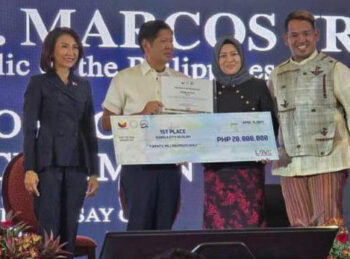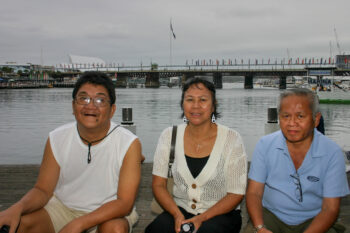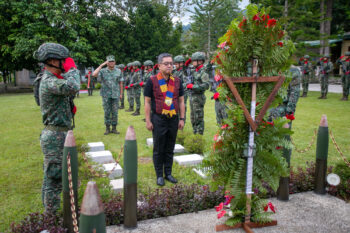CAGAYAN DE ORO CITY (MindaNews/25 August) — Any barangay, municipality, or city that made a mistake in its choice of officials during the last elections can do something about it even now to weed out the unresponsive, the incompetent, or the unreliable.
It’s a widespread problem that any citizen can do something about, doing our society a great favor. It just needs a recall initiative by a group of citizens. Recall of course is the legal process of having an undesirable official relieved and replaced by the constituents for loss of confidence.
In a democracy loss of confidence is a very serious matter, for it concerns the credibility, reliability, or competence of an official. Public confidence is essential for good governance. It is the most important aspect of public office, the basis for wielding power and authority.
Any official who loses the people’s confidence cannot govern properly or effectively; it will be big problem for him to decide or act on official matters. If he stays on without the people’s confidence or backing, or if he forces the issue, he will be stymied by legal challenges and outright non-cooperation, making his administration virtually inutile.
It is why in advanced democracies resignation or relief from the position usually follows a vote declaring loss of confidence in the leader or his party. Without public support, there is no point in holding on to the office.
*****
To ignore the issue or let it pass on the chance that it will go away will only worsen conditions in the community. It will encourage officials to think the people don’t really care, that there’s no penalty for being neglectful or even corrupt. They will take the community for granted.
Before long, people will wake up to find that from simple neglect or inattention, the issue has grown into outright corruption that will be difficult to undo. That’s why the issue of trust must be confronted decisively and resolutely—and why constituents must be vigilant, attentive to community affairs, with special focus on its governing processes. Otherwise abuse will creep in, incubate corruption, and become virtually unmanageable.
Preventing abuse and eradicating local corruption are best done by citizens of the community. They are the sovereign power, the ultimate authority—the Boss, as P-Noy prefers to call them.
Members of the community have every right to remove bad or unreliable officials. It’s why the law allows them to recall and replace officials without awaiting regular elections. It’s how they can rectify an error of judgment committed by the voters during the previous election.
*****
The law tells us that elected officials have no business staying in office if they fail to live up to promises or assurances they make during their candidacy—and that removing and replacing them without awaiting regular elections is the way to secure the wellbeing of our community.
Unfortunately, although this power is well enunciated in the law, we citizens seem reluctant or afraid to invoke it—perhaps out of fear of failure or, worse, fear of reprisals from powerful trapos or traditional politicians.
That may be so but it is unbecoming for powerful sovereign citizens to be intimidated by their own public servants. Servants are supposed to serve in a manner satisfactory to their masters—a duty or obligation intoned in their oath of office and job description.
If the officials are just inept or incompetent, all the more reason to remove them. The community shouldn’t be burdened with their salaries and benefits, letting them enjoy the perks of office, if they’re unreliable and undeserving of trust. Mere loss of confidence is a ground for recall.
*****
To rid a barangay, town, or city of an unwanted or undesirable executive, a simple procedure is provided by the Local Government Code (R.A. 7160), Sections 69-75. It will enable the people to make up for the mistake of enthroning unsuitable officials, replacing them with better leaders.
But it needs resolute citizens to launch the initiative; it won’t succeed if only a few support it because majority vote is needed. Otherwise even ordinary folks can take the lead if they have the will or determination to improve conditions in the community. They have but to assert their right to have officials they can rely upon.
“Sovereignty resides in the people and all government authority emanates from them” (Article II, Section 1, Constitution). This provision needs to be internalized by every Filipino, to invoke if the community’s welfare and its members’ right to good governance are an issue. It’s there to underscore the power of ordinary citizens.
Remember Dagohoy and Gabriela Silang? They were ordinary barrio folks. Even Andres Bonifacio was an ordinary fellow from a neighborhood of Tondo in Manila. None of them had exalted titles—no rank, no shiny buttons on their shoulder or chest.
They simply made bold to assert their sovereign right and power to demand good governance and justice. In the process, they sparked a great revolution.
The question is, where today are the Filipinos who can spark reform and revolution?
Manny is former UNESCO regional director for Asia-Pacific; secretary-general, Southeast Asian Publishers Association; director, development academy of Philippines; member, Phil. Permanent Mission to the U.N.; vice chair, Local Government Academy; member, Cory Government’s Peace Panel, and PPI-UNICEF awardee for outstanding columnist. valdehuesa@gmail.com







